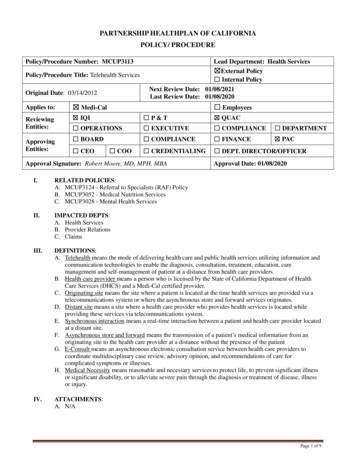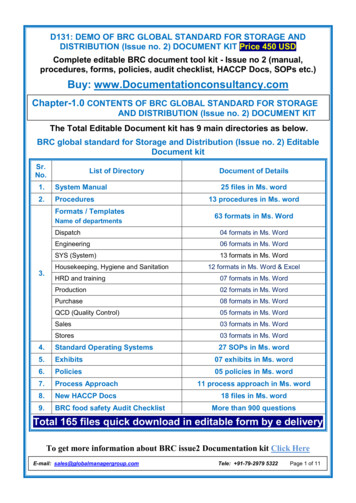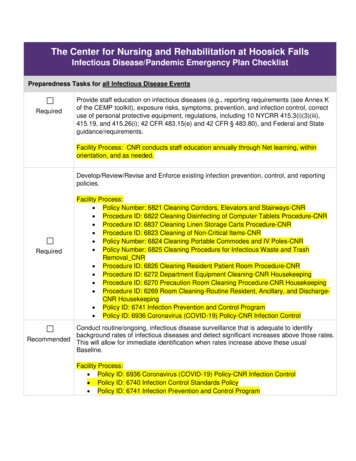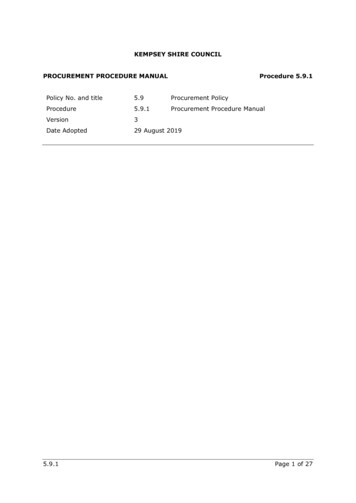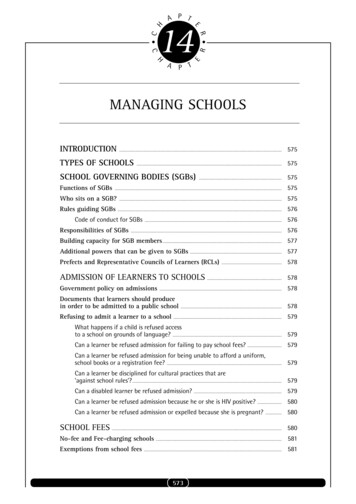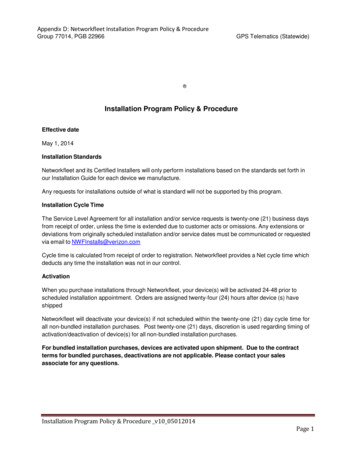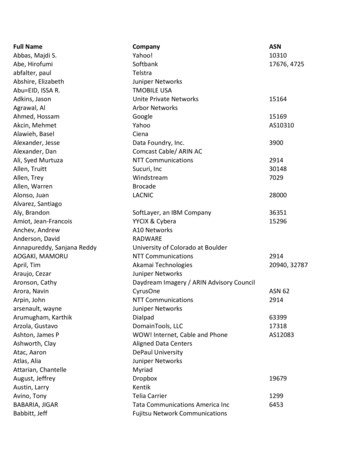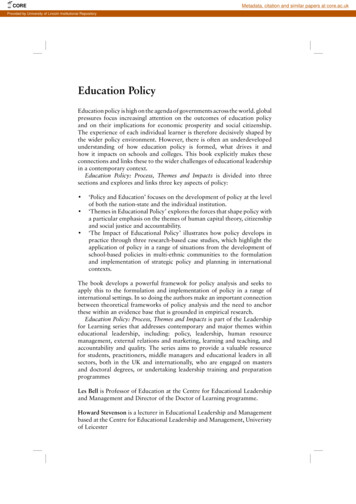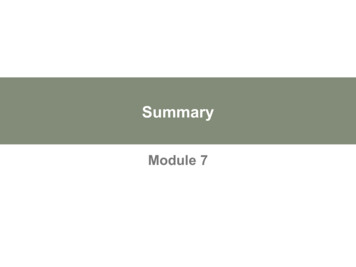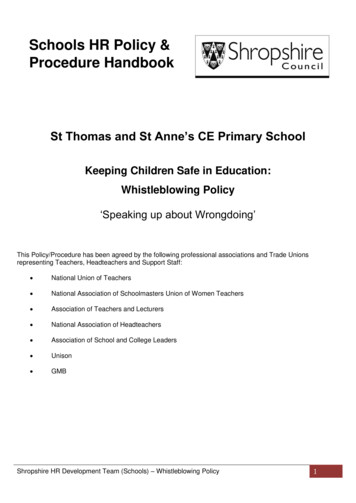
Transcription
Schools HR Policy &Procedure HandbookSt Thomas and St Anne’s CE Primary SchoolKeeping Children Safe in Education:Whistleblowing Policy‘Speaking up about Wrongdoing’This Policy/Procedure has been agreed by the following professional associations and Trade Unionsrepresenting Teachers, Headteachers and Support Staff: National Union of Teachers National Association of Schoolmasters Union of Women Teachers Association of Teachers and Lecturers National Association of Headteachers Association of School and College Leaders Unison GMBShropshire HR Development Team (Schools) – Whistleblowing Policy1
IF YOU HAVE SERIOUS CONCERNS IT IS YOUR DUTY TO TELL US AND OUR DUTYTO PROTECT AND SUPPORT YOUCONTENTS1.IntroductionPage 32.Aims and ScopePage 43.Serious ConcernsPage 54.SafeguardsPage 55.4.1 Harassment or Victimisation4.2 Confidentiality4.3 Anonymous Allegations4.4 Untrue Allegations4.6 Support To YouHow to raise a concernPage 5Page 6Page 6Page 6Page 6Page 66.How the School will respondPage 77.How the matter can be taken furtherPage 88.Standards of ConductPage 99.Follow proper proceduresPage 910Monitor & ReviewPage 10Shropshire HR Development Team (Schools) – Whistleblowing Policy2
1. IntroductionEnsuring that robust polices are in place to provide protection to staff in schools raising genuineconcerns in the work place is an important part of safeguarding children in education.Governing bodies and proprietors must ensure they adopt policies and procedures that meet withstatutory legislation.St Thomas and St Anne’s CE Primary School is committed to open and honest communication andthe highest possible standards of integrity. This will support safeguarding and promoting the welfareof all pupils in its care and expects all staff and volunteers to share this commitment.This procedure complies with the statutory guidance including “Keeping Children Safe in Education(KCSiE) 2016” from the Department for Education. This policy forms part of the HR KCSiEFramework to support schools to meet their responsibilities with regards to safeguarding and childprotection.Other HR KCSiE policies and guidance include: Safer Recruitment PolicyDBS Guidance for SchoolsSuitability Disqualification Guidance for SchoolsSingle Central Record Guidance for schoolsChild Reporting Concerns GuidanceWhistle Blowing ProcedureCode of Conduct for School Based StaffDealing with Allegation of Abuse Against Staff in SchoolsThe procedure closely follows the requirements of the Public Interest Disclosure Act providesemployees and those undertaking duties and responsibilities on behalf of the School with protectionwhen raising genuine concerns about wrongdoing in the workplace. It encourages disclosures to bemade internally in the first instance but also allows for certain protected disclosures to be made tospecific external bodies.The procedure ensures that employees and others who have serious concerns about wrongdoing areencouraged to speak up. This may need to be on a confidential basis and the School wishes toemphasise that if someone does “speak up” they can do so without fear of reprisals. Such policiesare termed “blowing the whistle” and this phrase should be viewed as a positive action of speakingup. It is understandable that employees may not express concerns because they may feel thatspeaking up would be disloyal to colleagues or they fear harassment/victimisation. The Schoolwould encourage all employees to not ignore concerns and to report them positively andappropriately.As a school within Shropshire, this policy provides a line of reporting to key individuals withinShropshire Council.Disclosures made under this procedure are monitored by the Governors as required under the PublicInterest Disclosure Act. Details of any disclosure remain confidential. Governors should ensure thatannual monitoring is reported to the full governing body.Shropshire HR Development Team (Schools) – Whistleblowing Policy3
2. Aims and ScopeThis policy aims to: provide avenues for employees to raise concerns and receive feedback on any action taken;allow employees to take the matter further if they are dissatisfied with the response;reassure employees that they will be protected from reprisals or victimisation forwhistleblowing in good faith.Employees may be the first to see that something is seriously wrong within the school. Suchwrongdoings may relate to: fraud and corruption;discrimination (i.e. a witnessing discrimination as a third party);abuse of vulnerable children/peopledamage to the environment.Health & safety breachesFailure to comply with legal proceedingsIt is the duty of employees to speak up when they have serious concerns and it is the duty of theSchool to act on those concerns and protect and support employees when they do. A failure toreport serious concerns could be construed as collusion. Difficult as it may be to speak up,employees should be aware of their special position and of their duty to make their concerns known.This policy is issued to employees and those undertaking duties and responsibilities on behalf of theSchool during induction to advise specifically on blowing the whistle on wrongdoing. It should not beconfused with the school complaints procedure (where parents can complain about the school orschool staff), the grievance procedure (where employees complain about their treatment as anemployee) or the Safeguarding/Child Protection procedure (specifically relating to working aroundchildren and young people). This policy is intended to cover concerns which fall outside the scope ofsuch policies and procedures.This policy is also made available to business partners, contractors, voluntary agencies, partnerships,and any others who the School has dealings with for distribution for their employees.3. Serious ConcernsSerious concern may be related to something that: is unlawful;is against financial rules, contract rules or other policies;does not meet established standards or working practices;amounts to improper conduct.Theft, bribery and corruption, safeguarding/child protection issues, service users or staff andenvironmental misuse are all the type of things which would fall into these categories.Shropshire HR Development Team (Schools) – Whistleblowing Policy4
Concerns in education settings may relate to the treatment of children and young people. This couldmean, for example, that a person or persons are: deliberately ignoring the best interests of the child or young person;teasing, harassing or touching a child or young person inappropriately;threatening a child, young person or a parent or distressing them in some way;neglecting a child by not giving them the support they need, including medical attentionor care;hitting or restraining a child inappropriately;using a child or young person’s money or possessions in an inappropriate way.Procedures for dealing with allegations or concerns about child abuse already exist and the namedperson in this school to whom such issues can be referred is Kate Budd – Headteacher. There is aspecific procedure for Dealing with Allegations of Abuse against School staff. This policysupplements the school’s safeguarding/child protection policy.There are existing procedures to enable employees to lodge a grievance relating to theiremployment.4.Safeguards4.1Harassment or VictimisationThe school recognises that deciding to report a concern can be difficult, not least because of the fearof reprisal from those responsible for the malpractice.The school will not tolerate harassment or victimisation and will take action to protect employeeswhen concerns are raised in good faith. However, if an employee is already the subject ofdisciplinary or redundancy procedures, those procedures will not be halted as a result of thewhistleblowing.4.3ConfidentialityThe School will do their best to protect employee’s identity when concerns are raised and anemployee does not want their name to be disclosed. It must, however, be appreciated that theinvestigation process may reveal the source of the information and a statement by may be requiredas part of the evidence.4.4Anonymous AllegationsThe school encourages employees to put their name to an allegation. Concerns expressedanonymously are much less powerful, but they will be considered at the discretion of theheadteacher, in conjunction with the Governing Body of the school. In exercising this discretion, thefactors to be taken into account would include: the seriousness of the issues raised;the validity of the concern;the likelihood of confirming the allegation from other sources.Shropshire HR Development Team (Schools) – Whistleblowing Policy5
Allegations which do not appear to be motivated by personal animosity and which if true, would haveserious implications for the school, are more likely to be considered, even though madeanonymously.It must be appreciated, however, that the investigation process may reveal the source of theinformation and a statement may be required as part of the evidence.4.5Untrue AllegationsIf allegations are made in good faith, but it is not confirmed by the investigation, no action will betaken against an employee. In such circumstances employees will be supported. If, however, anemployee makes a malicious or vexatious allegation, disciplinary action may be taken. The matterwould be referred to an appropriate school governor/committee before any action is taken.4.6Support to EmployeesThroughout and after this difficult process employees will be given full support from seniormanagement, concerns will be taken seriously and the School will do all it can to help employees.If possible, redeployment opportunities will be considered. Employees may also wish to seekconfidential support from their Trade Union/ Professional Association.5.How to raise a concernConcerns should normally be raised with an employee’s immediate line manager or the headteacher.This will depend, however, on the seriousness and sensitivity of the issues involved and who isthought to be involved in the wrongdoing.If the line manager or the headteacher or other school management is involved an employee maywish to report concerns to the Chair of Governors.Alternatively, employees can approach when approach the following individuals within ShropshireCouncil: Head of Paid Service - if the wrongdoing is about standards of behaviour;Shropshire Council Head of Legal, Strategy and Democratic Services - if the wrongdoing isthought to be illegal;Section 151 Officer - if the wrongdoing is about improper payments;Audit Service Manager - if the wrongdoing is a fraud;Head of Growth & Prosperity – if the wrongdoing about environmental issue;Head of Safeguarding – if the wrongdoing is a safeguarding issue.The above can be contacted by telephoning Customer Services on 0345 678 9000.Shropshire Council also operates a Whistleblowing Hotline where confidential disclosures can bemade. The contact number is 01743 252627.Employees can invite a trade union or professional association to raise the matter on their behalf.The earlier concerns are expressed the better and the easier it will be to take action. Concerns arebetter raised in writing and should set out: the background and history to the concern;Shropshire HR Development Team (Schools) – Whistleblowing Policy6
dates and places where possible;the reasons for the concern.In order to ensure the confidentiality, concerns should be sent in writing in a sealed envelopeaddressed to the appropriate person and clearly mark it “Strictly Private and Confidential - To beopened by the addressee only”.It is a serious disciplinary offence for any person to seek to prevent a communication of concernreaching an appropriate contact or to impede any investigation which he/she or anyone on her/hisbehalf may make.Although employees are not expected to prove the truth of an allegation, employees will need todemonstrate to those appointed to investigate the matter, that there are sufficient grounds to theconcern.6.How the School will respondWhen concerns are raised within the school the action taken will depend on the nature of theconcern. The matters raised may: be investigated internally by the school;be investigated by Shropshire Council but independently of those directly involved;be referred to the Police;be referred to an external Auditor;form the subject of an independent inquiry.In order to protect individuals and the school initial enquiries will be made to decide whether aninvestigation is appropriate and, if so, what form it should take. These will be made confidentially andevery attempt made to protect the employee. Concerns or allegations which fall within the scope ofspecific procedures (for example, child protection issues) will normally be referred for considerationunder those procedures. Some concerns may be resolved by agreed action without the need forinvestigation.Within ten working days of a concern being received, the school will respond in writing to theindividual raising a concern: acknowledging that the concern has been received;indicating how the School propose to deal with the matter;giving an estimate of how long it will take to provide a final response;confirming any initial enquiries already made;confirming whether further investigations will take place and, if not, why not.The amount of contact between those considering the issues and an employee raising a concern willdepend on the nature of the matters raised, the potential difficulties involved and the clarity of theinformation provided. If necessary, further information will be sought from the employee.When any meeting is arranged, an employee will have the right, if they so wish, to be accompaniedby a trade union or professional association representative or a friend who is not involved in the areaof work to which the concern relates. The meeting may be held at a mutually agreeable location.Shropshire HR Development Team (Schools) – Whistleblowing Policy7
If the employee should become involved in further investigations or procedures (e.g. disciplinaryproceedings or a criminal trial) as a result of using this procedure, they will be given every propersupport and assistance. The school would ensure that employees using this procedure are notdisadvantaged or unfairly treated.The school accept that employees need to be assured that the matter has been properly addressed.Thus, subject to legal constraints, employees will receive information about the outcomes of anyinvestigations and any changes to working practices as far as is reasonably practicable.7.How the matter can be taken furtherThis policy is intended to provide employees with avenues to raise serious concerns within theschool. The school hopes employees will find the procedure a satisfactory way of dealing withconcerns. An employee does have the right to take the matter outside of the school or ShropshireCouncil, the following are possible contact points: an external auditor;relevant professional bodies who regulate organisations (including the Ombudsman);a solicitor;the police;Public Concern at Work (Whistleblowing Charity) www.pcaw.co.uk 02074046609.The disclosure of confidential information would normally constitute a serious disciplinary offencewhich could result in dismissal or other disciplinary action. Accordingly, if an employee did take thematter outside the school or Shropshire Council they would need to ensure that either no confidentialinformation is disclosed or that there are wholly exceptional circumstances which the school wouldconsider justified in the circumstances.8.Standards of ConductEmployees working within this school are bound by the School’s Code of Conduct. Professionalbodies also have Professional Standards of Conduct which their members must adhere to. Teachersmust adhere to the Teacher’s Standards.Employees should also be aware of the Guidance for Safer Working Practice for Adults who workwith Children and Young People in Education Settings.All employees will be made aware of the standards which apply during induction and should ensurethey make themselves aware of such standards of conduct and follow them at all times.9.Follow Proper ProceduresOne of the best ways of guarding against corruption is to ensure that proper procedures are followed- in the way decisions are taken, in the way contracts are awarded and in the way employees conductthemselves.The most important of these procedures are described in the following procedural documents:1.2.3.4.KCSiE Code of Conduct for School Based Staff (which includes Gifts and Hospitality)E-Safety PolicyKCSiE Safer Recruitment Policy and ProcedureHarassment and Bullying ProcedureShropshire HR Development Team (Schools) – Whistleblowing Policy8
5.6.7.Guidance for Safer Working Practice for Adults who work with Children and YoungPeople in Education Settings.Schools Complaints ProcedureChild Protection PolicySchool to add in any additional documents recognised by Trade Unions (any not recognised by TUsshould be consulted upon before inclusion)Actions which breach these procedures are not only unauthorised but will lead to loss of publicconfidence and even to corruption.As with any other concerns on standards, you should report breaches of these procedures.10. Monitoring and ReviewThe Governing Body will monitor the outcomes and impact of this policy/procedure on an annual/biannual basis in conjunction with school representatives.This procedure will be reviewed no later than 2 years by Human Resources in consultation withTrade Unions.Shropshire HR Development Team (Schools) – Whistleblowing Policy9
This Policy/Procedure has been agreed by the following professional associations and Trade Unions representing Teachers, Headteachers and Support Staff: . 10 Monitor & Review Page 10. Shropshire HR Development Team (Schools) - Whistleblowing Policy 3 1. . employees and those undertaking duties and responsibilities on behalf of the School .
